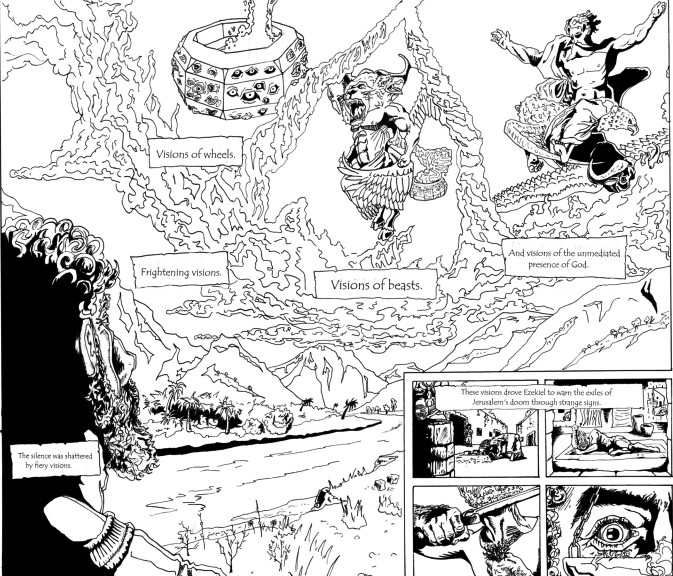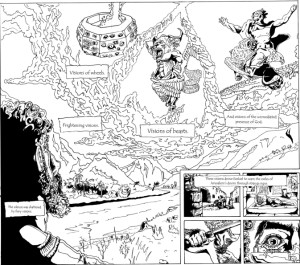
 In their final issue of 2015, Digital Humanities Quarterly (DHQ) dedicated nearly the entirety of its content to the theme “Comics as Scholarship.” Included among the sensational pieces there was B.J. Parker’s daring imagining and annotation of Ezekiel 16, a text “early Jewish communities were wary of including […and] Christian communities have likewise wrestled with.” Parker not only fashioned his own comics version of the scripture but also some of his own exegesis. Such an approach, says Parker, “requires the scholar/artist to engage in fascinating and novel means of reflection.”
In their final issue of 2015, Digital Humanities Quarterly (DHQ) dedicated nearly the entirety of its content to the theme “Comics as Scholarship.” Included among the sensational pieces there was B.J. Parker’s daring imagining and annotation of Ezekiel 16, a text “early Jewish communities were wary of including […and] Christian communities have likewise wrestled with.” Parker not only fashioned his own comics version of the scripture but also some of his own exegesis. Such an approach, says Parker, “requires the scholar/artist to engage in fascinating and novel means of reflection.”

 See Parker’s graduate student profile at Baylor University. His full adaptation can be downloaded as a .PDF file or .CBZ file for viewing (sans annotations).
See Parker’s graduate student profile at Baylor University. His full adaptation can be downloaded as a .PDF file or .CBZ file for viewing (sans annotations).

In August, Sequart featured an essay by the University of Calgary’s Tom Miller writing on the “transformation project” of Christian comics. Though he admits to a “small sample,” Miller focuses the essay’s attention on a particular category of Christian comics, namely “the holy works adaption” and its “two sub-categories: the tribute and the telling.”
He differentiates between the two by noting that ‘tellings’…
…eschew the poetry of the source material. Spiritual matter aside, the Bible is a work of beautiful poetry. So perhaps another answer to the question of what these texts bring to the original is a negative answer: they bring a removal of the poetry of the Bible. This removal of poetry is one of the most significant differences between the telling and the tribute adaptations, as we will see.
Miller alludes to two other categories of Christian comics beyond holy works adaptations, so perhaps Sequart will have Miller produce two sequel essays in the not-too-distant-future.
@ the intersection of religion and comics: Graphic Religion
 In their final issue of 2015, Digital Humanities Quarterly (DHQ) dedicated nearly the entirety of its content to the theme “Comics as Scholarship.” Included among the sensational pieces there was B.J. Parker’s daring imagining and annotation of Ezekiel 16, a text “early Jewish communities were wary of including […and] Christian communities have likewise wrestled with.” Parker not only fashioned his own comics version of the scripture but also some of his own exegesis. Such an approach, says Parker, “requires the scholar/artist to engage in fascinating and novel means of reflection.”
In their final issue of 2015, Digital Humanities Quarterly (DHQ) dedicated nearly the entirety of its content to the theme “Comics as Scholarship.” Included among the sensational pieces there was B.J. Parker’s daring imagining and annotation of Ezekiel 16, a text “early Jewish communities were wary of including […and] Christian communities have likewise wrestled with.” Parker not only fashioned his own comics version of the scripture but also some of his own exegesis. Such an approach, says Parker, “requires the scholar/artist to engage in fascinating and novel means of reflection.” See Parker’s graduate student profile at Baylor University. His full adaptation can be downloaded as a .PDF file or .CBZ file for viewing (sans annotations).
See Parker’s graduate student profile at Baylor University. His full adaptation can be downloaded as a .PDF file or .CBZ file for viewing (sans annotations).

